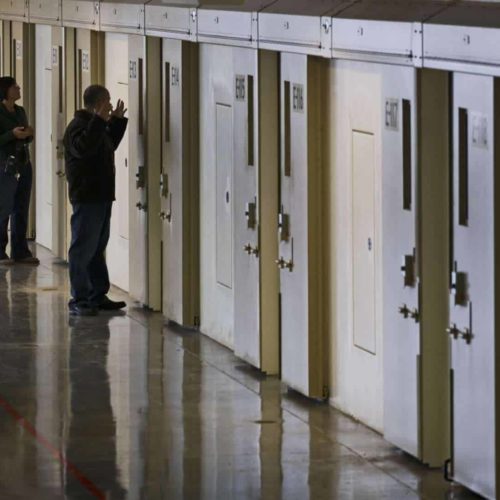Introduction

In the space of a minute, federal prison worker Jason Unwin was twice attacked by a furious, muscle-bound inmate on Dec. 21, 2010.
Agitated after a disciplinary hearing, the inmate first punched one of Unwin’s colleagues in the face, knocking him unconscious. He then turned to Unwin, a correctional counselor at the United States Penitentiary in Florence, Colo. “I was hit square in the face,” said Unwin, 51.
With a bloodied Unwin in pursuit, the inmate walked off. Seconds later, with Unwin briefly distracted, the inmate “blindsided me. He hit me with a closed fist, very hard, on the left side of the head. I was knocked unconscious.”
Unwin, a Federal Bureau of Prisons employee for 16 years, hasn’t worked since. He doesn’t have a full range of motion in his right shoulder, he said, and has been diagnosed with post-traumatic stress disorder. He has short-term memory problems, sleeps irregularly and faces seizure risks.
The saving grace: He is covered by a 96-year-old compensation program for injured federal workers. Under the Federal Employees Compensation Act of 1916 (FECA), he receives 75 percent of his former salary, tax-free; his monthly income is within a few hundred dollars of his previous salary.
Legislation pending in the U.S. Senate, however, ultimately would cut Unwin’s benefits and could affect many other government workers — especially those with modest incomes — in the future.
The measure, championed by Sen. Susan Collins, R-Maine, is included in a postal reform bill that may come up for a vote this month. Collins said it would stamp out abuses while saving money.
Yet officials with federal employees’ unions say the legislation would unfairly punish victims of workplace violence and other traumatic injuries — and their families.
“It’s a terrible message we’re sending to a federal law enforcement officer,” said Joe Mansour, national workers compensation representative for the Council of Prison Locals, an affiliate of the American Federation of Government Employees. “People are going to lose their homes. People are going to lose their cars.”
Under the proposal, compensation would be capped at 50 percent of pre-injury pay for FECA recipients at age 65. Now, benefits range from 75 percent for those with dependents to 66 2/3 percent for those without.
Recipients younger than 65 who have dependents would see their compensation reduced from 75 percent to 66 2/3 percent. Some people already on the rolls — Unwin among them — would see their benefits cut; only those with “permanent, total” disabilities would be untouched.
The cuts would be part of a broader overhaul of FECA designed to save money and dissuade older recipients from staying on the rolls in what some call a de facto retirement program.
“Retirement-age recipients’ benefits will better mirror what their counterparts in the federal pension systems and private sector workers receive under state laws,” Collins said in an emailed statement to the Center for Public Integrity. “This reform restores the mission of the program: supporting injured workers to recover and return to work, rather than offering a tax-free retirement.”
Not all members of Congress agree.
Sen. Daniel Akaka, a Democrat from Hawaii — who, like Collins, serves on the Senate Committee on Homeland Security and Governmental Affairs — said he has “serious concerns” about the plan.
“I am especially concerned that these provisions are retroactive and will change benefits for some employees who are already injured,” Akaka said in a statement. “We simply must not change the rules after the fact for disabled employees who were relying on the promise of these benefits.”
Caution before cuts
Experts believe that FECA may well be in need of a makeover. At a Senate hearing last July, Gary Steinberg, acting director of the Department of Labor’s Office of Workers’ Compensation Programs, recommended that “all claimants receive compensation at one uniform level of 70 percent [of their former salaries]. This … would remove disincentive to return to work, respond to equity concerns, and significantly simplify administration …..”
At the same hearing, Andrew Sherrill, director of Education, Workforce, and Income Security Issues for the Government Accountability Office, said key questions should be considered before broad changes are made.
Would benefit cuts for older recipients cause economic hardship? Would such cuts amount to “breaking the workers’ compensation promise” — under which an injured worker agrees not to sue in exchange for benefits that keep him or her afloat? And, would government savings in workers compensation costs result in fewer incentives to develop safe working environments?
Sherrill asked Congress to give “careful attention to outcomes that could result in any changes.”
Lawmakers who believe FECA is a gravy train are pressing ahead.
Some beneficiaries may be “gaming this crucial benefit at taxpayers’ expense,” Collins said in a press release last year. At the U.S. Postal Service, she said, 1,000 workers 80 or older were receiving benefits; 132 were 90 or older. “This abuse may extend across the government where the Department of Labor regularly pays benefits to employees in their 70s, 80s, 90s, and even 100s,” Collins said.
Akaka said the GAO was still studying the issue and warned against hasty action. “If we act prematurely without this important information, we may set benefit levels too low, seriously harming employees disabled in service to their country,” he said.
The Council of Prison Locals’ Mansour — a federal correctional officer who missed a year of work after being hurt responding to an emergency in 2003 — said the average officer makes less than $40,000 a year while facing the constant threat of assault from inmates. Mansour and other union officials say the current compensation system doesn’t promise a cushy retirement: Those who miss work for extended periods, like Unwin, don’t accrue vacation or sick leave and aren’t able to contribute to the Federal Employees Retirement System.
“If there was an amendment to reduce benefits paid to veterans who were injured in the line of duty, people would be screaming from the rooftops how unjust that would be,” said Michael Meserve, a council vice president. Those in the federal prison system, in effect, serve on a “domestic battlefield,” Meserve said.
An average of 160 employees per month have been assaulted by inmates since late 2007, Bureau of Prisons data show.
If his FECA benefit were cut, “I’d be screwed,” Unwin said.
“I still have a house payment. I still have a car payment. I wouldn’t be able to pay my bills,” he said. “It’s a stab in the back. … If they want to save money, cool, but don’t put it on our backs for doing our duty.”


Join the conversation
Show Comments